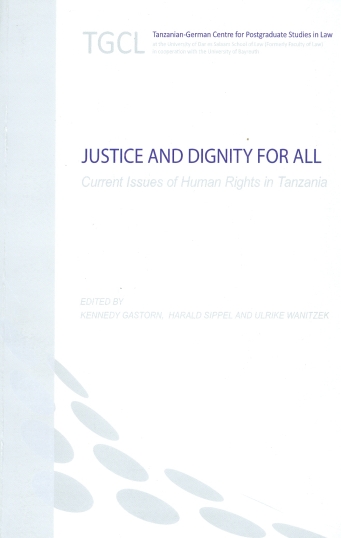


This volume is the first publication by the Tanzanian-German Centre for Postgraduate Studies in Law (TGCL). The centre was established in 2008 as a joint project of the Universities of Dar es Salaam (Tanzania) and Bayreuth (Germany) and offers a postgraduate study programme in law for LLM and PhD students conducted mainly at the University of Dar es Salaam School of Law (formerly Faculty of Law) in close cooperation with the University of Bayreuth. The focus of the programme is on human rights law, constitutional law and comparative law in East Africa, from both academic and practical points of view. Funds are provided by the German Academic Exchange Service (DAAD) and Aktion Afrika of the German Foreign Office within the programme African Excellence. Fachzentren zur Eliteförderung.
The present volume is mainly the result of two academic events, both held in the Nkrumah Hall of the University of Dar es Salaam in 2008, namely the inauguration of the Tanzanian-German Centre for Postgraduate Studies in Law on 4 September, and the conference in commemoration of the 60th anniversary of the Universal Declaration of Human Rights, held under the title “Justice and Dignity for All” on 25 November, which was co-organised by the Tanzanian Commission for Human Rights and Good Governance and the Tanzanian-German Centre for Postgraduate Studies in Law. The academic papers presented at these two events are reproduced in this volume, addressing the manifold current challenges to human rights in Tanzania which concern in particular some of the marginalised and less privileged sections of society. These include albinos and others who have become victims of mob violence and witchcraft killings. The articles are supplemented by an additional contribution providing a historical account of human rights from a European perspective.
CONTENTS
Kennedy Gastorn / Harald Sippel / Ulrike Wanitzek: Introduction – Current Issues of Human Rights in Tanzania
Chris Maina Peter: Justice and Dignity for All – The State of Human Rights in Tanzania
Edmund Sengondo Mvungi: Sixty Years of the Universal Declaration of Human Rights and Twenty Years of the Bill of Rights in Tanzania
Sifuni E. Mchome: The Challenge of Non-State Violations of Human Rights in Tanzania – A Case Study of Mob Violence, Intertribal and Witchcraft Killings
Axel Dörken / Joseph Matimbwi: Human Rights in Development Cooperation – The German Approach in Health Sector Cooperation in Tanzania
Eusebia N. Munuo: The Relevance of Law for Future Leaders in Africa
Mgongo Fimbo: Law Academics and Postgraduate Studies in Law for Future Leaders in Africa
Martin Otto: The Birth of Human Rights from the Spirit of Enlightenment – A Short History
About the Authors
Annex – Universal Declaration of Human Rights (UN General Assembly 10 Dec 1948)
Under these links you will find further studies on witchcraft and sorcery in Africa:
In ökonomischer Hinsicht ist Tansania eines der unterentwickeltsten Länder der Erde. Der Anteil der in der Landwirtschaft Beschäftigten beträgt über 80 Prozent, der Dienstleistungssektor ist überwiegend informell organisiert. Auf dem Gebiet der Demokratisierung und des Schutzes von Menschenrechten kann Tansania im Vergleich zu vielen seiner Nachbarstaaten jedoch eine durchaus bemerkenswerte Erfolgsbilanz aufweisen. Dennoch – das zeigen die Beiträge des Bandes, der aus zwei im Herbst 2008 an der Universität von Dar es Salaam abgehaltenen Konferenzen der Tansanischen Kommission für Menschenrechte und Gute Regierungsführung sowie des Tansanisch-Deutschen Fachzentrums für Rechtswissenschaft entstand – klafft nach wie vor eine gewaltige Lücke zwischen den verfassungsmäßig garantierten Grundrechten und deren konkretem Schutz. Chris Maina Peter führt uns in einem einleitenden und überblicksartigen Aufsatz vor Augen, dass nicht nur private Personen, sondern auch staatliche und parastaatliche Institutionen selbst systematisch Menschenrechte verletzen. Der tansanische Staat, so das harsche Urteil des Professors für Rechtswissenschaft, könne Grundrechte in den Bereichen Bildung, Gesundheit und Soziales nicht garantieren und sei mit seinen Verstößen gegen die Presse- und Informationsfreiheit sowie den jüngsten Privatisierungen im Sicherheitssektor unmittelbar für eine nach wie vor nicht zufriedenstellende Menschenrechtslage verantwortlich. Sifuni E. Mchome beschäftigt sich mit gewaltförmigen Konflikten zwischen Stämmen und mit der Tötung älterer Frauen, die aufgrund spezifischer körperlicher Merkmale der Hexerei beschuldigt werden. Die größte Herausforderung für die Durchsetzung von Menschenrechten in Tansania dürfte darin bestehen, dass es einer schwach ausgeprägten und mitunter kaum akzeptierten Staatlichkeit gelingen muss, Rechtsnormen Geltung zu verschaffen, die zum Teil im Widerspruch zu lokalen Traditionen, Wissensbeständen und Hierarchien stehen.
Marius Hildebrand in Portal für Politikwissenschaft, www.pw-portal.de/index.php?option=com_lqm&query=6&Itemid=2&task=showresults&ID_Buch_Link=41719; 22.3.2012, 1
© 2026 by Rüdiger Köppe Verlag – www.koeppe.de